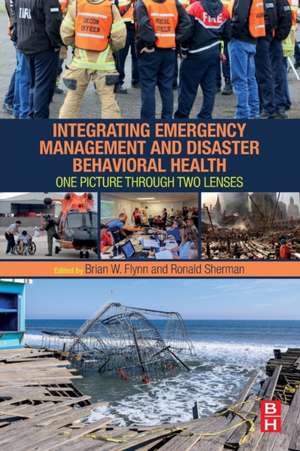Integrating Emergency Management and Disaster Behavioral Health: One Picture through Two Lenses
Editat de Brian Flynn, Ronald Shermanen Limba Engleză Paperback – 23 ian 2017
Each chapter features primary text written by a subject matter expert from a related field that is accompanied by a comment by another profession that is then illustrated with a case study of, or a suggested method for, collaboration.
- Addresses the current state of the collaboration between the emergency management and disaster behavioral health communities as presented from pioneers in their respective fields
- Focuses on practical examples of what works and what doesn’t
- Stresses both legal and ethical considerations and the public-private partnerships that are important for leadership in disaster situations
- Covers Emergency Operations Centers (EOCs) and risk communication
Preț: 547.10 lei
Preț vechi: 601.21 lei
-9% Nou
Puncte Express: 821
Preț estimativ în valută:
104.68€ • 109.60$ • 86.62£
104.68€ • 109.60$ • 86.62£
Carte tipărită la comandă
Livrare economică 29 martie-12 aprilie
Preluare comenzi: 021 569.72.76
Specificații
ISBN-13: 9780128036389
ISBN-10: 0128036389
Pagini: 370
Dimensiuni: 152 x 229 x 21 mm
Greutate: 0.6 kg
Editura: ELSEVIER SCIENCE
ISBN-10: 0128036389
Pagini: 370
Dimensiuni: 152 x 229 x 21 mm
Greutate: 0.6 kg
Editura: ELSEVIER SCIENCE
Cuprins
Section I: Context
1. Where Emergency Management and Disaster Behavioral Health Meet: Through an Emergency Management Lens
2. Where Emergency Management and Disaster Behavioral Health Meet: Through a Disaster Behavioral Health Lens
3. Why Is Integrating Disaster Behavior Health Essential to Emergency Management? Challenges and Opportunities
4. Why Is Integrating Emergency Management Essential to Disaster Behavioral Health? Challenges and Opportunities
Section II: Key Areas of Integration
5. Integration in Disasters of Different Types, Severity, and Location
6. Not All Disasters Are the Same: Understanding Similarities and Differences
7. What Can DBH Actually Do To Make Emergency Managers Jobs Easier?
8. Expanding the Tent: How Training and Education Partnerships with Other Professions Can Enhance Both EM and BH
9. Linking with Private Sector Business and Industry
Section III: Special Opportunities to Enhance Integration
10. Integration in the Emergency Operations Center (EOC)/Emergency Communications Center (ECC)
11. Risk and Crisis Communications
12. How to Navigate External Factors: Legal, Ethical, and Political Issues
13. Sustaining Integration: A Way Forward
14. Conclusion/Summary
1. Where Emergency Management and Disaster Behavioral Health Meet: Through an Emergency Management Lens
2. Where Emergency Management and Disaster Behavioral Health Meet: Through a Disaster Behavioral Health Lens
3. Why Is Integrating Disaster Behavior Health Essential to Emergency Management? Challenges and Opportunities
4. Why Is Integrating Emergency Management Essential to Disaster Behavioral Health? Challenges and Opportunities
Section II: Key Areas of Integration
5. Integration in Disasters of Different Types, Severity, and Location
6. Not All Disasters Are the Same: Understanding Similarities and Differences
7. What Can DBH Actually Do To Make Emergency Managers Jobs Easier?
8. Expanding the Tent: How Training and Education Partnerships with Other Professions Can Enhance Both EM and BH
9. Linking with Private Sector Business and Industry
Section III: Special Opportunities to Enhance Integration
10. Integration in the Emergency Operations Center (EOC)/Emergency Communications Center (ECC)
11. Risk and Crisis Communications
12. How to Navigate External Factors: Legal, Ethical, and Political Issues
13. Sustaining Integration: A Way Forward
14. Conclusion/Summary
Recenzii
"Behavioral health must be recognized as an essential component of emergency response. Everyone touched by disaster, whether as a survivor or rescuer, is affected mentally and emotionally by the experience, and the psychological effects can linger. Integrating Emergency Management and Disaster Behavioral Health is the guide both emergency management and behavioral health professionals need as a foundation for any sound disaster preparedness, response, and recovery strategy." --Former First Lady Rosalynn Carter, Co-Founder, the Carter Center














